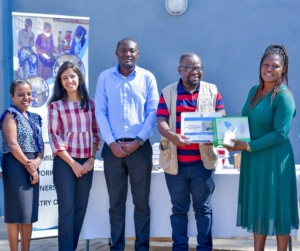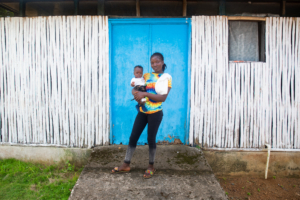By Divya Nair, Chief Technical Officer
My first six months as Last Mile Health’s Chief Technical Officer have been intense, energizing, and rewarding. I’ve spent time with our four country teams; settled into our growing office in Accra, Ghana; and immersed myself in our technical work. Among the projects I’ve worked on so far, I’m particularly excited to share the results of our Grand Bassa Impact Evaluation, a study our Liberia team conducted in partnership with the Ministry of Health to evaluate the impact of Liberia’s National Community Health Program on children in Grand Bassa County, as well as to add to the existing evidence base that paid, professional community health workers are effective at delivering life-saving child health services.

Chief Technical Officer Divya Nair (second from left) with Last Mile Health staff and representatives from the Malawi Ministry of Health.
With key support from Last Mile Health, the Liberian government launched its national program in 2016 to make primary healthcare universal by deploying community health workers to every rural and remote community in the country. The Grand Bassa Impact Evaluation design and implementation began in 2018—and five years later, the data show that community health workers are effective in the interventions they have been trained to deliver, especially for sick-child management. Often, in rural and remote communities, parents hesitate to take children to formal care providers due to lack of trust, but here we see direct evidence demonstrating how community health workers have built that trust. A key statistic that illustrates this is that in 2022, community health workers were the foremost care providers for sick children, delivering 40-50% of treatment for acute respiratory infections, fever, and diarrhea, as well as providing appropriate care for malaria and diarrhea. To put this in perspective, over the last three years, districts with the national program in Grand Bassa experienced more than a 20 percentage-point increase in receiving care for these major diseases as compared with districts not yet implementing it. There’s certainly room for improvement—for example, we must continue to think systematically to solve supply chain challenges and other obstacles that continue to hamper progress in service coverage. But community health workers themselves are doing very well in addressing what’s within their control: delivering quality primary care.
The results of the Grand Bassa Impact Evaluation are important—and the gathering and use of data itself is central to progress in the community health field. Without data, we wouldn’t know what’s working and what’s not. We can’t make decisions on what to prioritize. Data must be high-quality, systematic, and reliable, and it must be used effectively to inform program improvements and change outcomes.
We now have data that tangibly shows the power and potential of community health workers, and also reveals where challenges exist. If you give them the tools they need, they’re really able to deliver, especially for sick children. Where they’re less successful, it’s often because they’re lacking in the key conditions they need to succeed—which is why we continue our advocacy efforts at the national and global levels. Last month, our team attended the United Nations General Assembly, where we leveraged evidence like this to make the case for professional community health workers to be supported by global systems that prioritize and value them, that are less siloed, and that provide sustained financing so community health workers can work at their full potential. All this is especially challenging and critical in rural and remote communities that are our focus.
As I reflect on my first six months with Last Mile Health, I have confidence in our mission. We’re working to gather the right data. We aim to leverage it effectively. We’re sharing it broadly. Looking ahead, I am heartened by the dedication of my colleagues and the passion of community health workers who provide lifesaving care. In the words of Serkalem Getachew, a community health worker from Ethiopia who spoke on our panel at the International Conference for Primary Health Care, “Community health workers are the linkage to the health system for all patients in our communities. We are the most responsible in preventing maternal and child death in our communities. My message to health leaders and partners is that we must prioritize this.”
This post was originally published as part of Last Mile Health’s July-September 2023 quarterly report. Read the full report here.





